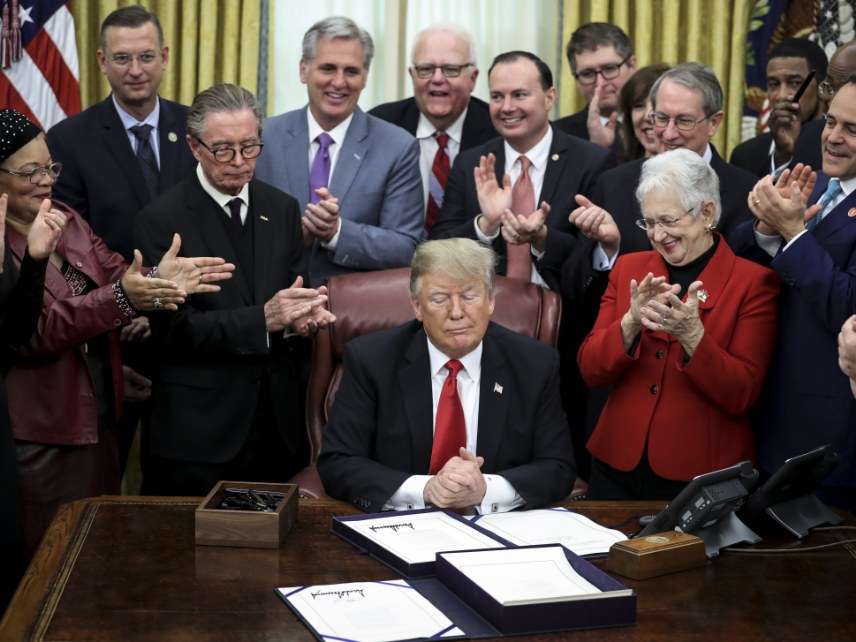Trump's Budget Shortchanges the Prison Reform Bill He Signed
The FIRST STEP Act called for $75 million for reentry programs. It's not listed in the White House's summary.

In President Donald Trump's proposed 2020 budget, released Monday, here's how the White House talked about funding for criminal justice reform:
The Administration is committed to breaking this cycle of recidivism by better preparing individuals to reenter communities and to mitigating the collateral consequences of incarceration. In addition to backing criminal justice reform through the FIRST STEP Act, the Administration supports efforts to bolster evidence-based programming in Federal correctional institutions. The Budget provides approximately $754 million for reentry programming in the Bureau of Prisons, including funding for education, career and technical training, substance abuse, and residential reentry centers. Of this amount, the Budget provides $14 million for the development of new and innovative pilot programs designed to address the needs of individuals incarcerated in Federal prisons.
There is a bit of a problem, here, though. That $14 million for new pilot programs is all well and good, but when the FIRST STEP Act was passed, it called for $75 million per year for five years to implement all its changes. The money doesn't appear to be listed here.
Reason's Eric Boehm noted in February that the omnibus spending bill passing through Congress did not have this money in it, and the bipartisan groups that pushed for the passage of the FIRST STEP Act were alarmed by its absence.
Now, groups are further alarmed that while Trump's budget proposal specifically invokes the Act's name, it doesn't clearly delineate that $75 million as part of the proposal. This doesn't mean it isn't going to be fully funded, but it's not clear where and how, and according to The Marshall Project, the White House is declining to answer their questions. Justin George notes:
Money for the law's costs could be set aside by the Department of Justice, but it was awaiting the confirmation of a new attorney general. That didn't happen until last month when William Barr was confirmed.
Monday marked the start of the lengthy budget process, which lasts into the fall and involves additions, subtractions, negotiations and redrafts between federal agencies, the White House and Congress. It is Congress that allocates funding. While nothing has been written in stone, Trump's plan indicates what the White House considers important, and it may foretell political fights to come over empowering the law or leaving it toothless.
The $754 million referenced for reentry systems refers to existing programs, and it's a $15 million increase over 2019's spending. Even if that increase all goes to expanded job training and other programs in the FIRST STEP Act designed to ease federal prisoners back into the real world, help them become functioning members of society, and hopefully not commit new crimes, that's still only half the money called for in the legislation.
To be clear, because we're big on reducing government waste and cutting spending, the Justice Department's budget doesn't have to increase by exactly $75 million to cover the expenses of the FIRST STEP Act. And it most certainly doesn't need to. We can say with confidence that there's already enough money sloshing around in the Justice Department to fully fund the legislation's new programs.
We should be concerned, though, that this budget summary doesn't indicate it has any plans to do so. Criminal justice reformers on the left, center, and right all came together to push through these very, very modest changes. Trump signed the bill and praised it, even referencing it in his last State of the Union address. He wants credit for the bill's passage, but that credit also requires that it actually be implemented, not just passed.
Here's a suggestion! The White House is proposing in this budget plan shifting responsibility for tobacco and alcohol enforcement entirely out of the Bureau of Alcohol, Tobacco, Firearms, and Explosives (ATF) to the Treasury Department instead. Why not put the rest of its duties in the hands of the FBI and kill the agency entirely?


Show Comments (9)